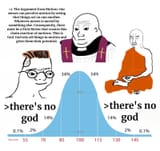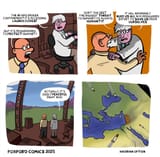Anonymous
(ID: TweL6WUo)
7/2/2025, 6:38:02 PM
No.509318963
[Report]
>>509319024
>>509319190
>>509320926
>>509323413
>>509328155
The chasm between belief and knowledge runs deeper than most recognize. Knowledge emerges from direct encounter—the burn of flame against skin, the weight of stone in hand, the demonstrable outcome of rigorous inquiry. It requires no defense because it needs none; reality validates itself through immediate experience or verifiable demonstration.
Belief, however, operates as knowledge's imposter. It masquerades as certainty while remaining fundamentally derivative—borrowed from authorities, inherited through culture, or constructed from emotional need rather than encountered truth. This wouldn't matter if belief acknowledged its provisional nature, but it rarely does. Instead, it crystallizes into conviction, demanding the same reverence as knowledge while lacking knowledge's foundation.
The crucial distinction lies not in their respective certainties, but in their relationship to inquiry. Knowledge welcomes examination because scrutiny only confirms what already stands firm. Belief, by contrast, must fortify itself against doubt, building elaborate justifications to protect what cannot withstand direct investigation. These defensive structures—doctrines, rationalizations, appeals to faith—become more important than the truth they supposedly guard.
When belief mistakes itself for knowledge, it commits a double error: it stops seeking what it thinks it has already found, and it treats provisional understanding as final truth. This transforms what should remain fluid and open to revision into something rigid and closed. True knowledge never fears displacement by deeper understanding, while belief often cannot survive even gentle questioning.
The path forward requires distinguishing between what we actually know through direct encounter and what we merely believe through inheritance or assumption—a distinction as essential as it is rare.
Belief, however, operates as knowledge's imposter. It masquerades as certainty while remaining fundamentally derivative—borrowed from authorities, inherited through culture, or constructed from emotional need rather than encountered truth. This wouldn't matter if belief acknowledged its provisional nature, but it rarely does. Instead, it crystallizes into conviction, demanding the same reverence as knowledge while lacking knowledge's foundation.
The crucial distinction lies not in their respective certainties, but in their relationship to inquiry. Knowledge welcomes examination because scrutiny only confirms what already stands firm. Belief, by contrast, must fortify itself against doubt, building elaborate justifications to protect what cannot withstand direct investigation. These defensive structures—doctrines, rationalizations, appeals to faith—become more important than the truth they supposedly guard.
When belief mistakes itself for knowledge, it commits a double error: it stops seeking what it thinks it has already found, and it treats provisional understanding as final truth. This transforms what should remain fluid and open to revision into something rigid and closed. True knowledge never fears displacement by deeper understanding, while belief often cannot survive even gentle questioning.
The path forward requires distinguishing between what we actually know through direct encounter and what we merely believe through inheritance or assumption—a distinction as essential as it is rare.

